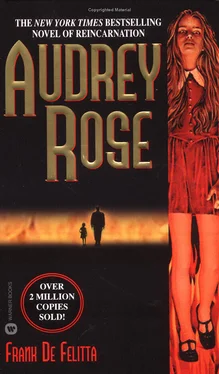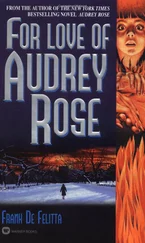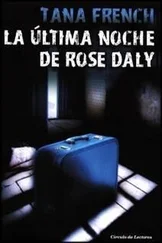“We’ll never be able to get this into the evidence. It’s a privileged communication.”
A soft, wheezing laugh which, at first, the lawyer mistook for a strained and flaccid fart preceded the appearance at the base of the wall of still another batch of documents, which, incredibly, turned out to be a Xeroxed copy of a 1040 form for the year 1967—the joint return of William P. and Janice Templeton.
Mack’s amazement was unbounded.
“Don’t tell me you also broke into the Treasury Department!”
“I’ll tell you all about it one day.” The detective chuckled, then instructed: “Turn to the clipped page.”
Mack’s fumbling fingers found the clip and turned to a page of medical deductions, a long and detailed list that only gradually revealed its secret. And there it was—on two separate lines—the lead to the Park East Psychiatric Clinic and, immediately below it, the item that blew their privilege.
It was too much for the attorney’s bruised and battered mind to handle all at once. Too goddamn much to think about while sitting on a crapper with his pants on the floor in the heart of the citadel of justice.
Brice Mack shook his aching head in a weary but happy way and tried to lean back against the wall but was prevented from doing so by a complication of pipes and knobs which dug into his back and which started him laughing. A laughter soon joined in by the old, lovely, besotted, beet-faced ex-cop in the adjoining stall. Mack could envision the dying eyes staring out of the pickled face, and the pathos of the image suddenly struck at his heart roots, and his laughter eased as memory took over. The memory of something his father had once said to him—long ago—after a bum had come to their door for a handout and, for good reason, was politely refused.
“My pity, I could not help him,” Max had said in Yiddish, weeping. “He is a man, a creature made in God’s image, with a mind and a spirit that might have been the salvation of the world. It is my pity that I could not help him.”
A humble smile came to Brice Mack’s lips as he thought about all the avenues that Reggie Brennigan—this creature in God’s image—had opened to him. And then he thought of what Elliot Hoover had said, and the smile became fixed. The machine purred smoothly forward under its own power—aligning forces, creating events, introducing people.…
Could it be?
Was it really possible?
The sight of the lean olive-skinned man, soberly dressed in dark suit and carrying a slim briefcase, stepping through the door into the courtroom at 8:55 a.m. on Tuesday, triggered a sudden déjà vu in Bill Templeton. Somewhere, recently, he had seen this man, had seen the face in close proximity thrust before his own in a fleeting encounter. He couldn’t be certain where, only that the face was familiar and that his instinctive reaction was one of panic.
Bill’s eyes fastened blatantly on the man’s face as he walked through the rail gate and took a seat at the end of their row.
It was at this weak and anxious moment that the identity of the man came to him in a sudden flash. They had met at the Park East Psychiatric Clinic. They had almost collided in the hallway that day he went to examine Dr. Vassar’s notebook.
Bill felt a cold sweat sprout on his face as Judge Langley, cross and tired, entered the courtroom and hurriedly convened the court. Bill’s memory of the man’s name was soon refreshed by Brice Mack, who stood and, in a voice both bright and eager, said, “I call as my next witness Dr. Gregory Alonzo Perez.”
Even before Perez stood up, Janice saw the quick, puzzled expression leap into Scott Velie’s eyes as he turned to the courtroom, studying first the witness moving through the gate, then Bill, with a gaze that was intensely questioning. Bill’s only response was to sigh deeply and shake his head in an abject way.
The news-hungry press leaned forward in their seats as the witness took the stand and was sworn in by the bailiff. A polite silence ensued while Brice Mack allowed Perez to make himself comfortable.
“Would you state your full name, please?” he asked in a soft, friendly voice.
“Gregory Alonzo Federico Perez.”
“And what is your profession?”
“I am a Doctor of Psychiatry.”
Bill recalled the thin Spanish-accented voice from their phone conversation of more than two months before.
“Are you licensed to practice in this city?”
“Yes.”
“And at what address do you practice?”
“I hold a clinical appointment at the Park East Psychiatric Clinic at 1010 Fifth Avenue.”
An expression of fear passed over Janice’s face at the mention of the clinic.
“Will you tell the jury when you first received your appointment at the Park East Clinic?”
“Immediately after completing my training at the Sheppard and Enoch Pratt Hospital in Towson, Maryland, I arrived at Park East and served my internship there. The year was 1966.”
“At that time were you brought into contact with Dr. Ellen Vassar?”
Scott Velie’s lips pursed as if to speak, but he restrained himself.
“Yes, I worked closely with Dr. Vassar as her assistant for six years, until her death in 1972.”
“Would I be correct in assuming that during that time you were familiar with most of Dr. Vassar’s cases?”
“Yes. All her cases.”
“Are you familiar with a case involving a patient named Ivy Templeton, who received treatment from Dr. Vassar during the period commencing December 12, 1966, and extending through September 23, 1967?”
Scott Velie rose slowly, his brow furrowed pensively, and in a flat, undramatic voice, said, “This is privileged information, Your Honor. Defense is getting into the question of a doctor-patient relationship, and this is privileged, and we object to it on that basis.”
Mack, with an eye on the jury, quickly interposed, “There’s no question that the privilege exists, Your Honor; however, in this case there has been a waiver of the privilege by the child’s parents.”
“At no time,” Velie lashed back, “have the parents of Ivy Templeton waived the privilege, Your Honor. I contend the question violates the doctor-patient privilege rule and is objectionable, and I—”
Judge Langley had begun to bang his gavel and cut in with: “Just a second here.” Then, turning a questioning face toward Brice Mack: “Are you prepared to make an offer of proof to support your claim of waiver?”
Mack, savoring this moment, said, “I am prepared to introduce into evidence three documents that clearly establish a waiver by the parents of Ivy Templeton of the doctor-patient privilege. One, the claim filed by Mr. and Mrs. Templeton with the Mutual Insurance Company of Manhattan. Two, the insurance claim form of the Mutual Insurance Company of Manhattan, completed by Dr. Vassar and submitted to the insurance company. And three, the written supplementary statement concerning Ivy Templeton’s mental disturbances, prepared by Dr. Vassar and submitted to the Mutual Insurance Company of Manhattan, all at the request of and with the authorization of Mr. and Mrs. Templeton.”
Velie shouted, “That’s not really a true waiver! It was only made for the purpose of collecting insurance money and wasn’t intended to reveal the nature and contents of the child’s illness!”
Judge Langley banged the gavel.
“They can’t have their cake and eat it,” he admonished the prosecutor. “They wanted to get reimbursed, and they had no objection to submitting information on the child’s illness to a third party—namely, the insurance company’s file clerks, typists, claim adjusters, and so forth. You can’t claim privilege here, Mr. Velie. I deem it’s been waived. Objection overruled.”
Читать дальше












